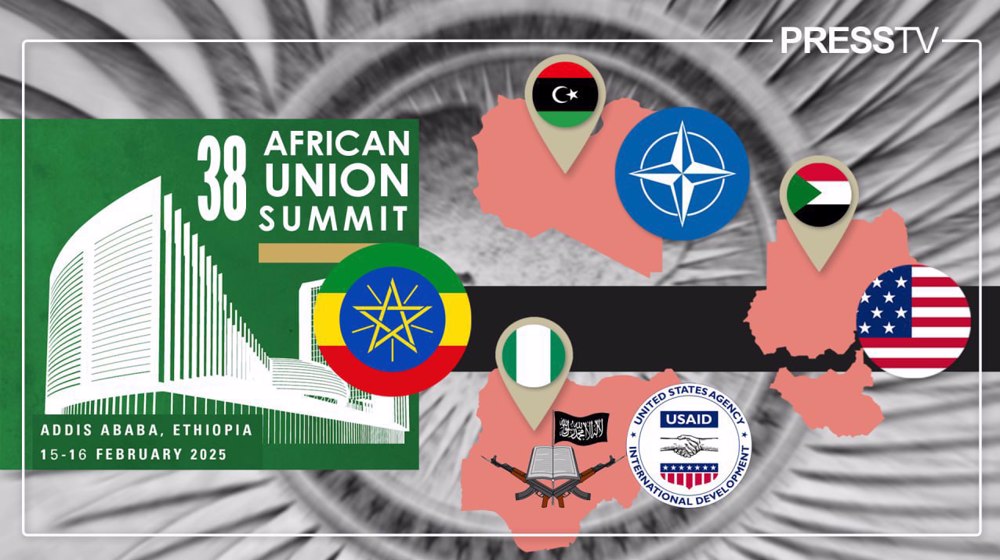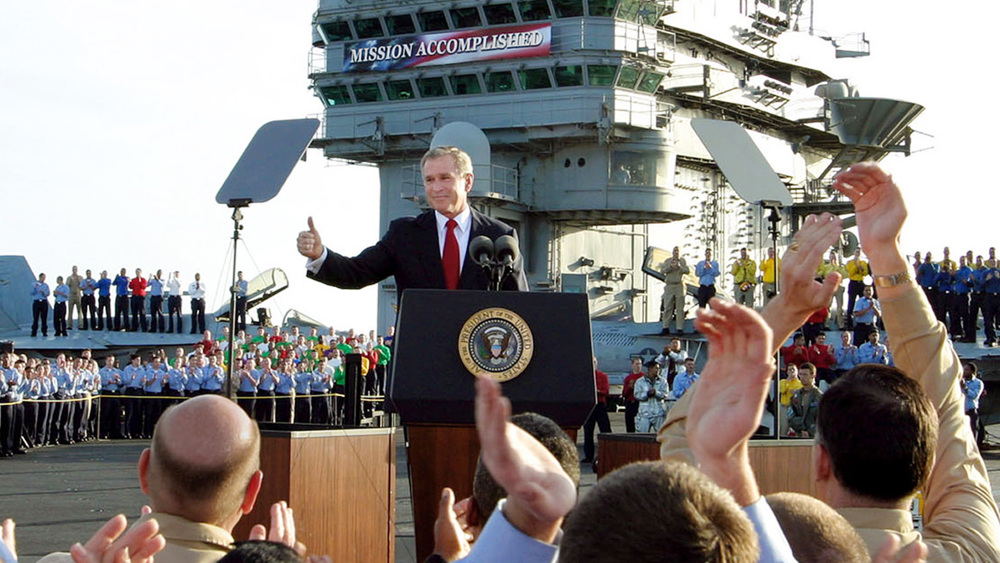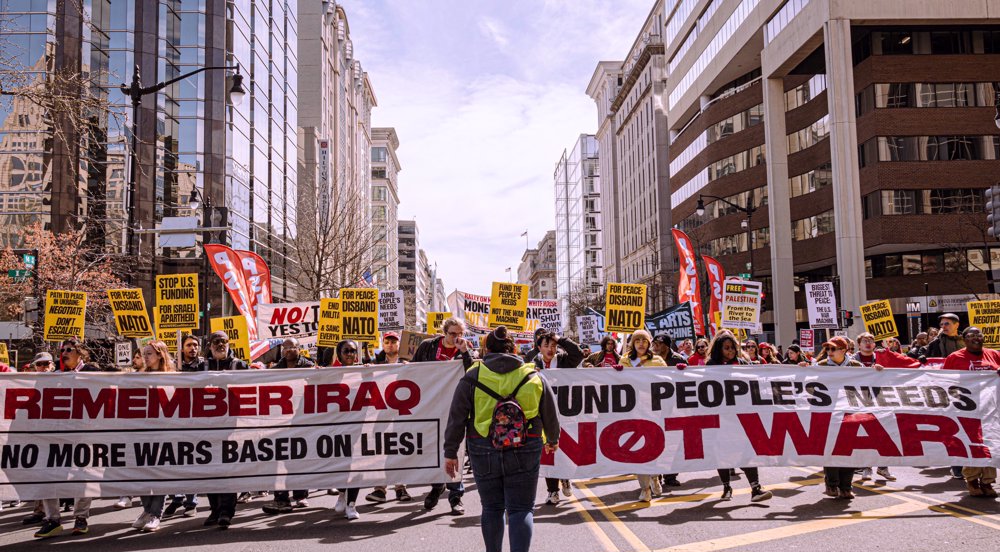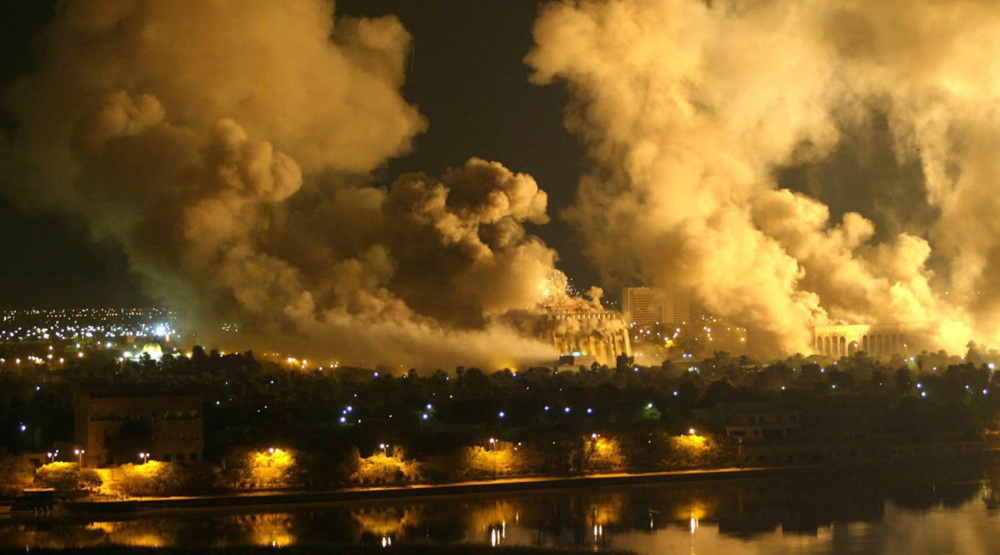How mainstream media sold Bush's Iraq War disaster and got away with it
By Mohsen Badakhsh
Twenty years ago — on May 1, 2023 — then-US President George Bush triumphantly made a now-infamous "Mission Accomplished" speech onboard the aircraft carrier USS Abraham Lincoln, announcing the end of "combat operations" in Iraq.
The so-called "combat operations" had a devastating impact on the Arab country that suffered years under the brutal military dictator Saddam Hussein, leaving a trail of death and destruction.
Corporate mainstream Western media -- who constantly preach accuracy, objectivity, and fairness as journalistic principles-- played a key role in selling this reckless military adventurism and the military occupation that followed and continues to date.
These so-called “journalists,” who relied entirely on claims made by American military officials and dismissed assertions of the other side, ended up cheering massive atrocities committed by US-led coalition forces, describing Iraqi civilians and locals in areas attacked by their troops as “suspected terrorists” or "insurgents".
Thus, the truth became the first and biggest casualty in this war that in the first place had no rationale or no raison d'être.
US media coverage of the Iraq war
The US-led military occupation of Iraq, which now enters its 21st year, has been described as the most widely and closely reported war in modern military history, with television network coverage broadly seen as “pro-war”.
One of the most widely circulated US dailies with intimate ties to the military establishment, the New York Times ran an article on September 8, 2002, insisting that Saddam was seeking to develop weapons of mass destruction (WMDs).
The article titled "US Says Hussein Intensifies Quest for A-Bomb Parts" would later be discredited, leading the newspaper to issue a public statement and concede that it had not checked the facts of the story rigorously enough before publishing it.
It is worth noting here that the Times or the US military-industrial complex never expressed any concern about Saddam's indiscriminate use of chemical weapons against Iranian soldiers and civilians during the 8-year war it imposed on Iran in the 1980s, soon after the Islamic Revolution toppled a brutal US-installed autocrat. The weapons were supplied to him by Western regimes.
At the outset of the US-led invasion of Iraq in March 2003, as many as 775 reporters and photographers were accompanying American military forces as embedded journalists, and the task was cut out.
These reporters signed contracts with the military establishment and agreed to be mouthpieces of the military-industrial complex.
When asked why the military decided to embed journalists with the troops, Lt. Col. Rick Long of the US Marine Corps brazenly admitted: "Frankly, our job is to win the war. Part of that is information warfare. So we are going to attempt to dominate the information environment."
The statement made it quite obvious that mainstream media outlets reserve the right to be partial and biased when they see fit or when it comes to the American military’s "interests".
In 2003, a study released by Fairness and Accuracy in Reporting stated the news network disproportionately focused on pro-war sources and left out anti-war sources. According to the study, 64 percent of total sources supported the Iraq War while anti-war sources made up only 10 percent of the media.
A September 2003 poll further revealed that 70 percent of Americans were falsely led to believe that Saddam was involved in the 9/11 attacks. While 80 percent of the hawkish Fox News viewers were found to hold at least one such belief about the brutal invasion of Iraq, only 23 percent of the liberal PBS viewers believed the false claims.
Media critics argue that such figures show misleading coverage of the war by the mainstream American media. However, viewers in other countries were less likely to have such beliefs.
A post-2008 election poll by FactCheck.org also found that 48 percent of Americans believed Saddam played a role in the 9/11 terror attacks. The group further concluded that "voters, once deceived, tend to stay that way despite all evidence."
What public opinion says 20 years after Iraq’s invasion
While a March 2003 Gallup poll right after the invasion of Iraq found that 76 percent of Americans supported the bloody military aggression, a 2023 Axios/Ipsos survey two decades later revealed that 61 percent of Americans believe that the US did not make the right decision by invading Iraq. That’s how truth reveals itself.
Another poll published on Monday by the AP news agency revealed that an overwhelming majority of American adults distrust the country’s mainstream media, believing that they are responsible for aggravating political polarization in the US and misinforming their audience.
Concern about the threat posed by misinformation unites Americans of both dominant political parties, with nearly 9 in 10 US adults pointing to misinformation as the key problem, according to the latest survey conducted by The Associated Press-NORC Center for Public Affairs Research and Robert F. Kennedy Human Rights advocacy organization.
A third of American adults state that they see news stories with false claims from politicians or misleading headlines every day, according to the poll, whose results were released just ahead of the so-called World Press Freedom Day on Wednesday.
It further shows that Americans have significant concerns about misinformation — and the role played by corporate media conglomerates closely tied to the military-industrial complex along with politicians and social media giants in fanning it.
Overall, nearly 6 in 10 participants insisted that the news media is responsible for the rampant spread of misinformation, and a similar percentage also said it is primarily responsible for it.
Ex-US officials now admit massive, unaccountable atrocities
Former acting Pentagon chief Christopher C. Miller recently said the US must hold senior American military leadership accountable for the failed wars in both Iraq and Afghanistan.
Miller, who served as acting US secretary of defense from November 9, 2020, to January 20, 2021, wrote in a memoir titled “Soldier Secretary,” released this week, that the US military-industrial complex has now become a “hydra-headed monster” with “virtually no brakes on the American war machine.”
“The more I thought, the more I was horrified,” Miller emphasized as quoted in a report by The Hill news outlet in February.
“We invaded a sovereign nation, killed and maimed a lot of Iraqis, and lost some of the greatest American patriots to ever live — all for a goddamned lie.”
The book offers an insight into the life of an American soldier who rose to the top of the Pentagon as he grew increasingly indignant about the US military-industrial complex’s hunger for death and destruction abroad.
Miller also stated in an interview with the outlet that there is an urgent need for accountability in the upper ranks of the Pentagon.
US officials never held accountable for Iraq war crimes
American forces and commanders committed unimaginable war atrocities, including mass killings and brutal torture of civilians labeled as “suspected terrorists” during the military occupation of Iraq and continued to do so.
Evidence of prisoner abuse inside the US-run Abu Ghraib prison became public in April 2004, backed by widely released photographic evidence exchanged among American soldiers as a sort of fun sport.
Only seven soldiers were reportedly convicted and sentenced to short jail terms for involvement in the horrifying torture and humiliation of Iraqi detainees.
Critics, including some of the convicted, complained that senior officers and officials had been spared and never held accountable for horrendous crimes committed by them.
Even though the American occupation of Iraq has widely been recognized and denounced as a massive violation of international law and Article 2(4) of the UN charter, no international body, including the United Nations, has held American leaders accountable for it.
Legal experts argue that the right to determine how to enforce its UN resolutions lies with the UN Security Council alone, not with individual nations and therefore the invasion of Iraq was not legal under international law, and in direct violation of Article 2(4) of the U.N. Charter.
This speaks volumes about the apathy of the world body and the extent of illegitimate US influence on the New York-based organization that persistently fails to fairly address atrocities and injustices, often perpetrated by certain permanent members of the UN Security Council that wield veto powers.
America’s appalling history of war crimes, coup attempts, regime change schemes and repeated interference in the internal affairs of other countries – especially Muslim countries – should serve as an important paradigm for leaders, politicians and people in independent countries to stand up to the military-industrial complex and the mainstream media, which is an extension of this complex.
Mohsen Badakhsh is an educator and freelance journalist.
(The views expressed in this article are the author's own and do not necessarily reflect those of Press TV.)

Until we meet again: A letter to the ‘master of resistance’ Sayyed Hassan Nasrallah

To regain legitimacy, African Union must cut imperialist ties and put Africans first

Trump-Zelensky ‘shouting match’ shows how US props up and discards ‘allies’
Syrian regime declares curfews in several regions
Sudan takes UAE to UN court over 'complicity in genocide'
Trump's threats will embolden Israel to ignore ceasefire: Hamas
Hamas ready for 'all possibilities' after 'last warning' by Trump
Iran elected vice president of OPCW panel despite US opposition
Lavrov: Macron 'preparing to use a nuclear weapon against Russia'
Iran FM in Saudi Arabia for OIC meeting on US depopulation of Gaza
VIDEO | US alliances crumbling under Trump, South Korea next?












 This makes it easy to access the Press TV website
This makes it easy to access the Press TV website